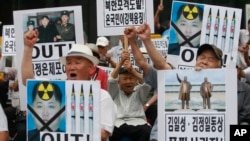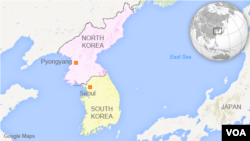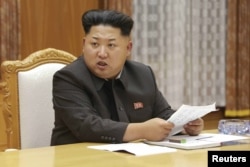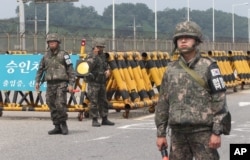North and South Korea have agreed to hold emergency high-level talks, in an attempt to end a tense standoff that had brought the two rivals to the brink of war.
South Korean President Park Geun-hye's national security advisor and an aide to North Korean leader Kim Jong Un are set to meet Saturday at 6:00 p.m. local time (0900 UTC, 5 a.m. EDT) at the Panmunjom truce village.
North Korea had given the South until 5:00 p.m. Pyongyang time Saturday (0830 UTC, 4:30 a.m. EDT) to stop anti-Pyongyang propaganda broadcasts near the border. Seoul refused to do so, and the deadline passed without any apparent incident.
Seoul restarted the propaganda broadcasts last week for the first time in over ten years following a landmine explosion that wounded two South Korean soldiers. Pyongyang says it viewed the broadcasts as a declaration of war and has threatened to attack them.
Earlier Saturday, eight South Korean and U.S. fighter jets conducted simulated bombings in South Korean territory Saturday in a "show of force" against Pyongyang's threats.
North Korea deployed additional weapons near the flashpoint border in preparation for a possible strike, according to the Yonhap news agency.
"Our military and people are prepared to risk an all-out war not just to simply respond or retaliate, but to defend the system our people chose," read a statement by the North's Foreign Ministry on Saturday.
"The situation has reached the verge of war and can no longer be reversed," added the statement, published by the North's Korean Central News Agency.
'Quasi-state of war'
North Korean leader Kim Jong Un placed his military forces on high alert Friday and declared front-line areas to be in a "quasi-state of war." The two countries have technically been at war since their 1950s conflict, which never officially ended in a peace treaty.
Seoul has said it will respond harshly to any North Korean provocations.
"We are closely monitoring the situation," presidential spokesman Min Kyung-wook said Saturday. "We are ready to strongly respond to any North Korean provocations."
U.S. defense officials say annual drills by American and South Korean military forces were halted temporarily Thursday after Seoul and Pyongyang exchanged fire along their western border.
The U.S. Assistant Secretary of Defense for Asian and Pacific affairs, David Shear, said the exercises were suspended to avoid contributing to inter-Korean tensions, but have since resumed as planned.
Thursday's violence began when North Korea fired shells at South Korean military positions along their western border. The South answered with volleys of dozens of 155-millimeter artillery rounds. No damages or casualties were reported, and it appeared most shells fell in the four-kilometer-wide DMZ separating the two Koreas.
Seoul accused Pyongyang of planting landmines that exploded this month near the border, wounding the two South Korean soldiers. That incident appeared to have sparked the resumption of propaganda broadcasts into the North.
South Korea raises military level
South Korea has raised its military readiness alert to its highest level, Jindogae 1, indicating immediate danger, imminent attack or invasion. President Park Geun-hye met with her National Security Council and also visited an army headquarters south of Seoul.
Korea analyst Daniel Pinkston, of the International Crisis Group in Seoul, told VOA neither side wants war, but also feels it is impossible to back down.
“I think that both sides want to avoid a high intensity conflict, but nevertheless there’s a possibility of miscalculation and inadvertent escalation,” Pinkston said.
Youmi Kim in Seoul, Bill Ide and Fred Wang in Beijing, and Ken Schwartz, William Gallo and Jeff Seldin in Washington contributed to this report.








